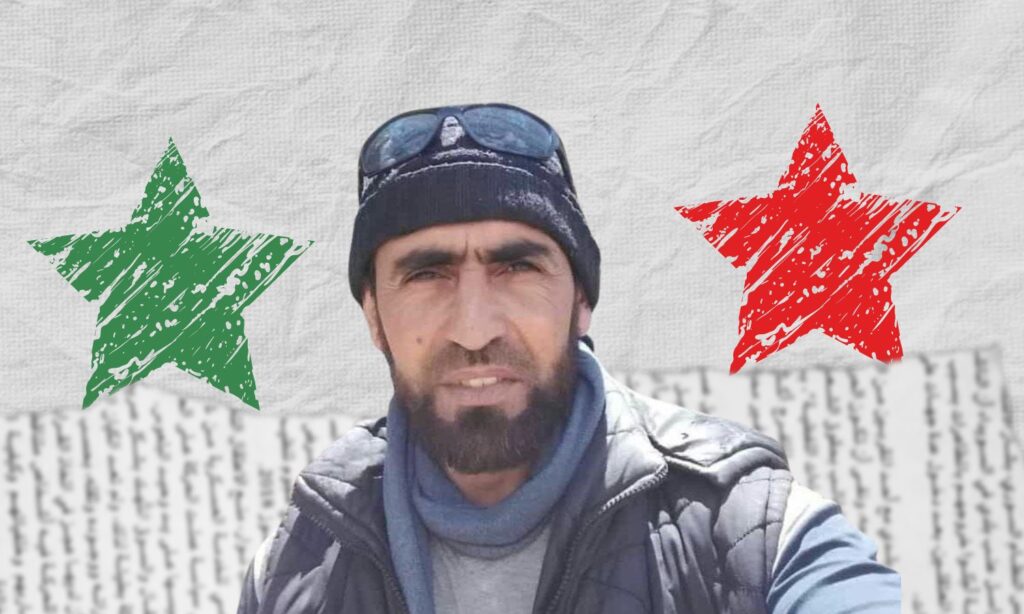Conflicting reports have been raised since the announcement of the killing of the commander of the Islamic State (IS) group in southern Syria about the identity of the executing party as the regime’s media outlets say the ‘haunt’ was a security operation carried out by the Syrian forces in Daraa governorate.
The pro-regime al-Watan newspaper said on 10 August that the security services managed to kill Abu Salem al-Iraqi, the security leader of the IS group in southern Syria, during an operation it carried out in the village of Adwan near Tafas town in the western countryside of Daraa.
Enab Baladi obtained intersecting information from three local fighters who participated in the besieging of al-Iraqi, stating that an unorganized group of people from the area attacked al-Iraqi’s whereabouts in Adwan village.
The fighters interviewed by Enab Baladi (who spoke on condition of anonymity) were operating in the Southern Front, a former key unit in the Free Syrian Army (FSA) during the opposition’s control of southern Syria.
The former fighters did not participate in any military action alongside the regime or against it since they handed over their arms due to the so-called reconciliation settlement in 2018.
The Syrian regime did not participate with its main or auxiliary forces in the attack, and confrontations were limited to locals who gathered in an unorganized group, according to what the fighters told Enab Baladi.
The attack began with dozens of people and ended with the gathering of large numbers of people from the areas surrounding Adwan village, they added.
Enab Baladi’s local correspondent in Daraa reported that civilians found the body of al-Iraqi on 10 August in the al-Jamal roundabout, east of the town of Muzayrib, hours after his killing.
Local residents, whom Enab Baladi interviewed, raised questions about the reasons why the Syrian regime left the body for hours if the regime was the one who carried out the attack.
Another fighter from Tafas town told Enab Baladi that a man was killed when al-Iraqi detonated his explosive belt. He was a former fighter of the Free Syrian Army, and he had not previously joined the regime’s groups.
The local monitoring group, Horan Free League, said Yahya al-Mohammad, a local fighter who was negotiating with al-Iraqi to surrender himself, had been killed when the senior IS commander blew himself up inside his house.
IS as a pretext to keep control
Despite the Syrian regime’s control over southern Syria under the “security settlement” deals four years ago, the siege, raiding, and encirclement operations continued on some towns and villages under the pretext of the presence of the Islamic State, although local dignitaries keep denying the presence of any IS’ sleeper cells or pockets.
The regime forces are currently besieging the town of Tafas, accusing its residents of harboring fighters affiliated with the Islamic State group, although a statement was issued by the region notables stating that the wanted men had left it, followed by a statement issued by the wanted men themselves talking about their departure from Tafas, but the regime did not change the situation on the ground.
Last July, the regime also sent military reinforcements to the town of Jassim, demanding the exit of wanted men from the town, whom it also accused of belonging to the Islamic State, and threatening military action in the event of their refusal.
The regime’s Security Committee warned the notables of Daraa al-Balad to escalate if the wanted men stayed in the town, prompting the local Central Committee of Daraa to dissolve itself, leaving negotiations to the notables.
In January 2021, the regime forces besieged the town of Tafas and demanded the deportation of six people to northern Syria, namely Iyad Jaara, Abu Tariq al-Subaihi, Iyad al-Ghanim, Mohammad Jadallah al-Zoubi, Mohammad al-Ibrahim, and another who was killed in the regime-planned attack.
After negotiations with the Central Committee, the regime abandoned the condition of deportation in exchange for a pledge by the region’s notables that the wanted persons would not carry out any aggressive or armed operations.
The siege ended after the regime forces raided several farms in the southern countryside of the town and seized seven individual weapons.
The regime forces besieged the town of Daraa al-Balad in July 2021 in an attempt to storm it, following a demand for the deportation of people, including Mohammad al-Masalmeh, nicknamed “al-Hafu,” and Muayyad Harfoush, a former commander in the armed opposition.
The military campaign ended with deploying eight military detachments inside Daraa al-Balad and seizing individual weapons without deporting the two wanted men.











